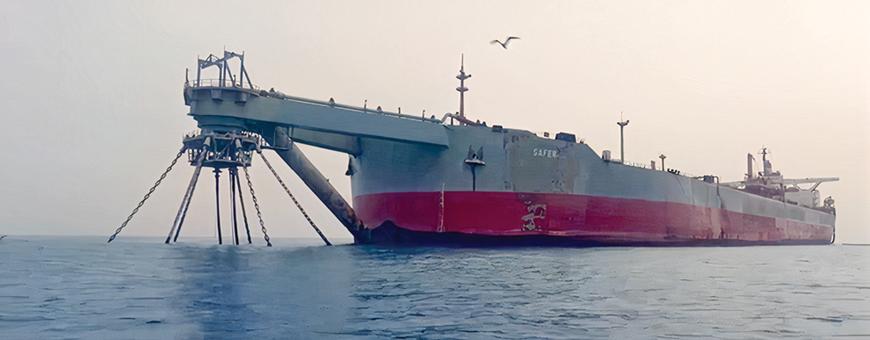You are here
UN lays out plan to prevent oil tanker disaster off Yemen’s coast
By Batool Ghaith - May 10,2022 - Last updated at May 10,2022

A view of the floating storage and offloading (FSO) facility 'Safer', an ageing oil tanker off Yemen’s Red Sea coast (Photo courtesy of UNDP)
AMMAN — The floating storage and offloading (FSO) facility “Safer”, an ageing oil tanker off Yemen’s Red Sea coast, will cost approximately $20 billion to clean up if oil spills, according to United Nations Resident and Humanitarian Coordinator for Yemen David Gressly.
The 45-year-old FSO Safer, long used as a floating oil storage platform with 1.1 million barrels of crude on board, has been moored off Yemen’s western Red Sea port of Hodeida since 2015, without being serviced, according to AFP news agency.
During a media briefing at the UNDP Regional Hub Office for Arab States in Amman, Gressly emphasised the threat the vessel poses.
It is a “catastrophe waiting to happen”, he said.
Gressly noted that the vessel has not had any maintenance “for years” and is “rapidly getting worse every day”, which may lead to a major humanitarian, economic and environmental catastrophe.
“The impact of any spilled oil will be catastrophic,” he said. The vessel holds four times the amount of oil than the Exxon Valdez, which spilled in 1989.
If oil were to spill from the vessel, it would have a “tremendous” effect on the environment, as well as would damage shipping, tourism, fishing, and the livelihoods of people who are already suffering, Gressly said.
He noted that the damage could potentially also reach other countries, such as Saudi Arabia, Djibouti and Somalia, as well as potentially impact tourism in Egypt and Jordan.
However the civil war and conflict in Yemen makes it very difficult because “we need all parties to cooperate”, who are currently in conflict, said Gressly.
“It is necessary to find an agreement and also extremely important to have everyone on board for the initiative,” he said.
He indicated that the government of Yemen and the Sanaa-based authorities have committed to facilitating the success of the project.
Gressly noted that during the meeting a two-step plan was agreed upon. While working to replace the existing FSO with one of equivalent storage capacity, which can take up to 18 months, the oil will be placed in a temporary vessel, so it does not pose a threat to the environment any longer, he said.
The budget for the two-track operation is $144 million, including $79.6 million for the emergency operation, which is higher due to the “highly insecure” environment, according to Gressly.
“Our operational plan is now completed, and we are moving forward with the contracting. Once the work begins it will take approximately two months to do the work on the existing vessel, and secure the oil to avoid any spilling, which is the first part of the operation, then the long-term replacement will start,” he said.
Gressly noted that on Wednesday, the Netherlands and the United Nations will co-host a pledging event to support the UN-coordinated plan to address the threat.
“Implementation of the plan cannot begin without donor funding,” he said, noting that they will reach out to the private sector for funding as well, as the only issue is mobilising resources.
“We are aiming to complete the operation no later than September of this year, as it cannot wait, and in hopes of avoiding work during winter months and the harsh weather,” Gressly said.
Gressly indicated that selling the oil is “complicated” due to legal ownership and who controls the oil.
According to a statement from UNDP, a major spill would devastate fishing communities on Yemen’s Red Sea coast, as the half a million people who work in the fishing industry there have 1.7 million dependents. Two hundred thousand livelihoods could be instantly wiped out and whole communities would be exposed to life-threatening toxins.
The environmental impact of a major spill on water, reefs and life-supporting mangroves on Yemen’s coast and potentially across the Red Sea would be severe. Desalination plants on the Red Sea coast could also be closed, cutting off a water source for millions of people, the statement said.
Related Articles
DUBAI — Yemen’s Houthi rebels have signed a UN agreement hoped to help stop a rusting oil tanker in the Red Sea becoming an ecological and h
DUBAI — Yemen’s Houthi rebels confirmed they have given the green light for a UN mission to inspect and repair a long-abandoned fuel tanker
DUBAI — The United Nations is launching a crowd-funding campaign for an operation intended to prevent an ageing Yemeni oil tanker from unlea















